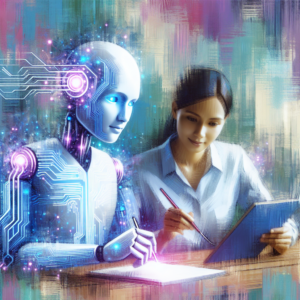Does AI make you more productive? When you start typing “does AI make…” into Google, it offers up “does AI make you more lazy” and “does AI make students lazy.”
From the autocomplete suggestions it’s obvious that people are uncertain about AI. They are worried AI will make us lazy. That it will cause a decline in critical thinking skills by doing the thinking for us. Critical thinking skills are important in almost every job on Earth. But when you let AI do the critical thinking for you, is there a need for you anymore?
Which leads to another major fear most people have of AI: losing their jobs. So far despite a few stories like that of the Indian CEO who replaced his whole customer support team with a chatbot, massive job losses to AI have not materialized.
The Big Question: Does AI Increase Productivity?
In a study carried out by Lakhani, McFowland III, Mowlick, Professors from MIT Sloan, a group of workers were divided into three groups. One group had access to ChatGPT 4. Another group had access to ChatGPT 4 with guidelines on how to use it. The last group had no AI tools.
They were given a task to write a 2500-word article. The first group saw a 38% increase in productivity, the second group saw a 40% increase, and the last group saw none, leading to the conclusion: “Generative AI can improve a highly skilled worker’s performance by as much as 40% compared with workers who don’t use it.”
So, yes, indeed, AI actually helps productivity. The researchers who carried out the study conclude that using AI to boost productivity is a great idea, but importantly, employees using it must not depend on it entirely.
That is because AI has the proclivity to hallucinate, or generate convincing but incorrect answers.
When I checked them on Google, they were all made up by AI! Every single one of them.
I once tried to use AI to generate academic citations for a research paper I was writing. It gave me believable papers with sources. When I checked them on Google, they were all made up by AI! Every single one of them. AI is not an all-knowing sentient repository of knowledge, it’s just a network of parameters. So we must learn to employ critical thinking skills when using AI.

AI can help you be more productive by doing some tasks for you like sorting through emails or creating document templates, but major AI companies are pushing their wares as assistants who work with people (e.g. Microsoft’s CoPilot) rather than artificial replacement workers.
AI has a lot of productivity potential in education. It can show you fun and interactive ways to study and understand tricky subjects. AI is the Great Explainer (mansplainer?). If you want to learn more about say, risk assessment, you can ask a good AI chatbot to explain it to you in very simple terms and with endless patience and an ability to restate the lesson in multiple ways. It all adds up to educational productivity, a.k.a. faster learning.
Five Ways AI Can Boost Your Productivity
Rarely do we ever hear people talking about the positive side of AI these days. Everything is about fear and anxiety. But there is so much untapped potential with the tools that are already available. And when we talk about using AI to boost productivity, we are not only talking about the office. Here are some other uses you can or already may be using AI:
1. Time Management: AI-powered time management apps like Todoist can up your productivity game by analyzing past behavior to predict future actions. For instance, Todoist could learn that you’re most productive in the mornings and schedule important tasks during that time.
It could also consider external factors like traffic or weather to adjust schedules accordingly. With natural language processing, it could understand complex instructions like “prioritize work-related tasks this week” and automatically organize your calendar. Through continuous learning, these apps adapt to your changing habits and preferences, helping you make the most of your time by focusing on what matters most.
2. Personal Finance Management: LLMs like Claude can analyze spending habits, create budgets, and provide recommendations for saving and investing. The free version of Claude allows you to upload attachments. Upload a spreadsheet of your expenses (it could be for a month or week, however you want it). Ask Claude to provide recommendations based on that, and you’ll be amazed. It’s definitely an interesting way to use AI.
3. Health and Fitness Tracking: AI-powered health apps like Fitbit uses advanced algorithms to analyze data from wearables and smartphones, providing personalized insights and recommendations.
For example, based on your activity levels and sleep patterns, the app will suggest adjusting your workout routine or improving sleep hygiene for better recovery. It can also track nutritional intake, offering meal suggestions tailored to your dietary goals and preferences.
4. Language Learning and Translation: You can employ ChatGPT, Claude, Gemini and other LLMs as tutors when learning a new language. Ask difficult questions about the language you’re learning. Prompt a model to practice the language with you. They can read the language aloud for you to get the pronunciation right. It can personalize lessons and provide instant feedback, making your language learning journey that much easier.
5. Smart Home Automation: Imagine coming home from work to a perfectly lit and climate-controlled environment, with your favorite music playing softly in the background—all thanks to AI-powered smart home automation.
With a system like Amazon Alexa or Google Assistant, you can schedule routines that automate tasks like turning on lights at sunset, adjusting the thermostat based on your schedule, and even starting your coffee maker in the morning. ItI not only saves you time but also enhances energy efficiency, making everyday life more convenient and sustainable – which makes you more productive.